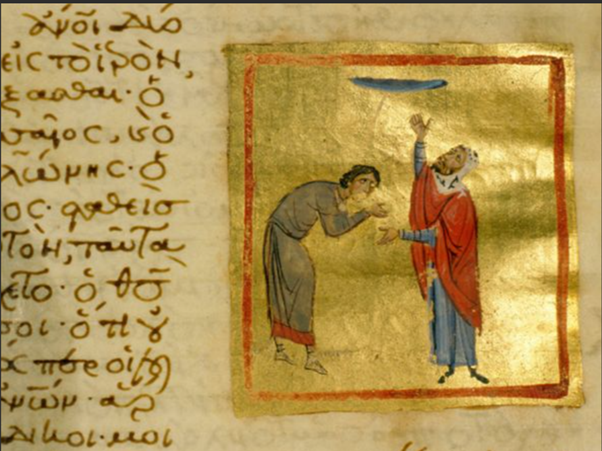This Sunday, the lectionary invites us to ponder Luke 18:9-14. The English Standard Version supplies the passage with the heading “The Pharisee and the Tax Collector.” It’s a parable. Jesus told it as a follow-up to his parable of the persistent widow, which I discussed last week.
That parable is about a widow who relentlessly pestered a judge to order her community to treat her fairly, justly. Finally, fearing physical assault by her, the judge did what the widow wanted.
In that parable, Jesus’ point is that until he returns, the quality of his disciples lives will depend on the mercy of others. His point is unexpected: the disciples must prod God to act justly. If they act and pray relentlessly, their opponents will back down and act justly.[1]
Now, Jesus tells them how they are to pray. He tells of two men who go up to the Temple to pray. The Temple is a place where sacrifices were made continuously to expiate, to drive away, punishments for sin.
One of the two men is a Pharisee. The other is a tax collector.
The Pharisees were people who strived to please God – just as Jesus urges us to strive to please God. But their way of pleasing God was centred on following rules: rules like washing in a certain way before eating, like giving to God a tenth of everything they received, like not walking more than a certain distance on the Sabbath, the day of rest.
The Pharisees in the stories Jesus told, and in the reports of his encounters with them, were people who were eager to get others to do as they did, to live as they did. They believed they were obeying God. They believed they were being righteous.
Jesus appreciated that. He even told his disciples that their righteousness should exceed that of the Pharisees. You can read it in Matthew 5:20, in the Sermon on the Mount, a summary of things Jesus repeated often.
The Bible mentions three Pharisees favourably. They are Nicodemus and Gamaliel, who were well-known Jewish leaders, and the apostle Paul.
So, Jesus is not condemning Pharisees. He’s condemning pharisaical behaviour: behaviour whichemphasizes external, detailed rule-keeping; behaviour which neglects mercy, humility, and justice. Jesus is not condemning criticism of others. Jesus is condemning criticism of others while ignoring our own need for reform.
The other person in Jesus’ story is a tax collector. Tax collectors were hated, because they collected taxes for the Roman empire, an empire with brutal rulers like Herod Antipas who killed John Baptist and Pontius Pilate who killed Jesus.
Tax collectors often used violence to collect taxes. They often collected more than they were supposed to and kept the surplus for themselves. Worse, the rulers used the taxes to pay brutal soldiers, and to pay for massive projects to grandly display their power to oppress. They did nothing to meet the people’s need for food, shelter, and health.
Just as not all Pharisees were self-centred and lacking in mercy, not all tax-collectors were detestable. In the next chapter, Luke will tell of Zaccheus, whom Jesus approved. The apostle Matthew was also a tax collector – he worked for Herod Antipas.
The key point Jesus’ makes is that we must evaluate ourselves just like God evaluates us. We must not evaluate ourselves by comparing ourselves to others, like the Pharisee, who says, in verses 11 and 12,
“God, I thank you that I am not like other men, extortioners, unjust, adulterers, or even like this tax collector. I fast twice a week; I give tithes of all that I get.”
Jesus commends the tax collector who would not even look up to God but looked down. The tax collector could only mutter, in verse 13,
“God, be merciful to me, a sinner!”
Jesus ends by saying that those who think highly of themselves will drown but those who think lowly of themselves will be saved.
Why is that so? The apostle Paul, the former grand master of pharisaical behaviour, gives us the answer. In his letter to the church in Rome, the capital of the oppressive empire, he says:
“for all have sinned and fall short of the glory of God.”[2]
To honour God, we must do much and avoid much. The Bible has many positive lists[3] and many negative lists.[4]
But we know that no one has always done all the positive things, and no one has always avoided all the negative things.[5] The Pharisee left this knowledge out of his description of himself. The tax collector put this knowledge in the centre of his description of himself.
The Pharisee boasted. The tax collector pleaded. How about us?
Peace be with you.
Picture credit: The Pharisee and the Publican, from Tetraevangelion, 12th century, Manuscript illumination, via https://thevcs.org/pharisee-and-tax-collector.
[1] We do however know from the history of martyrdom, including how the first apostles died, that this is not always the case.
[2] Romans 3:23.
[3] Perhaps the best example of a positive list is “fruit of the Spirit,” found in Galatians 5:22-23. There’s also 1 Corinthians 13:4-8; Ephesians 4:31-32; 1 Corinthians 1:10; 1 Timothy 5:10.
[4] For examples of negative lists, Galatians 5:19-21; 1 Corinthians 6:9-10; Ephesians 5:3-5; Romans 1:29-31.
[5] Excepting of course Jesus, the perfect man.
To learn more about Rama, click here.



Pingback: Pondering Zaccheus: I know what Luther did one summer in Leisnig – Bangsar Lutheran Church